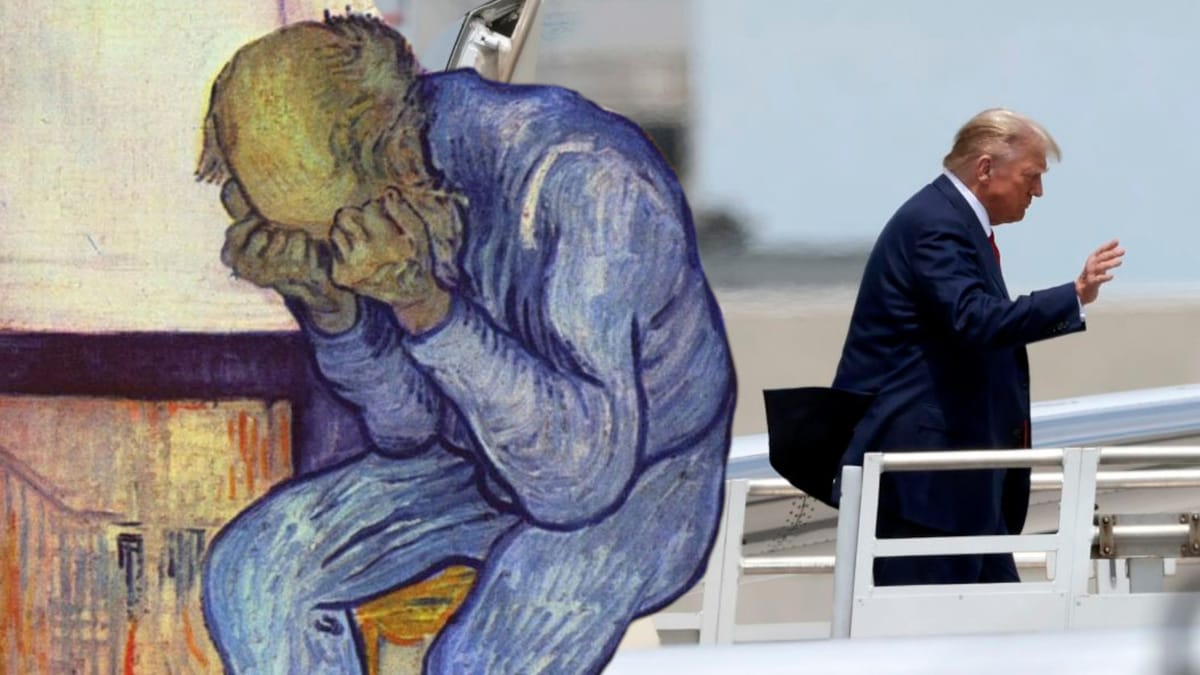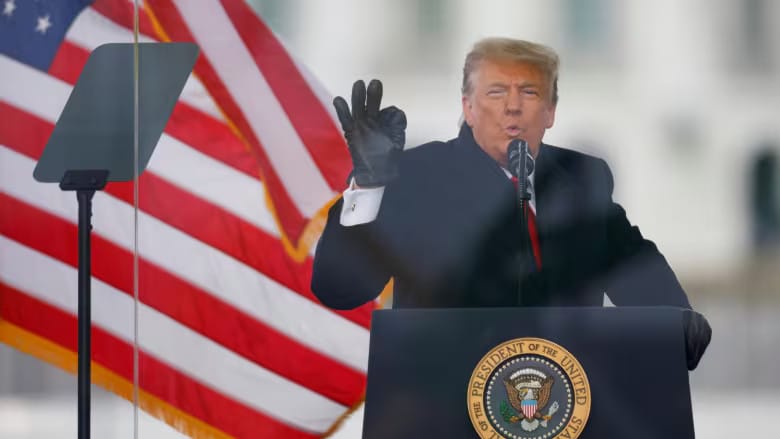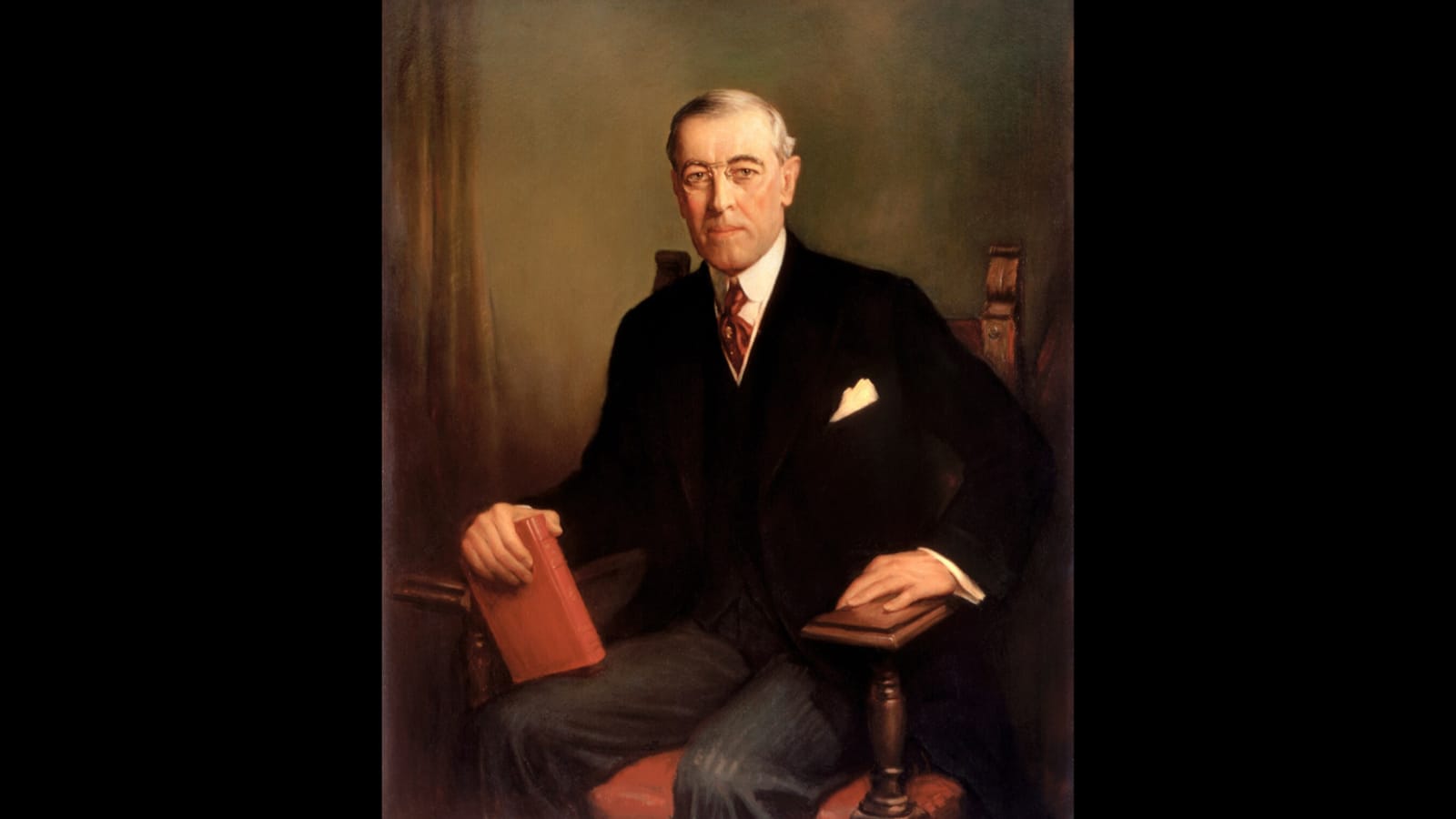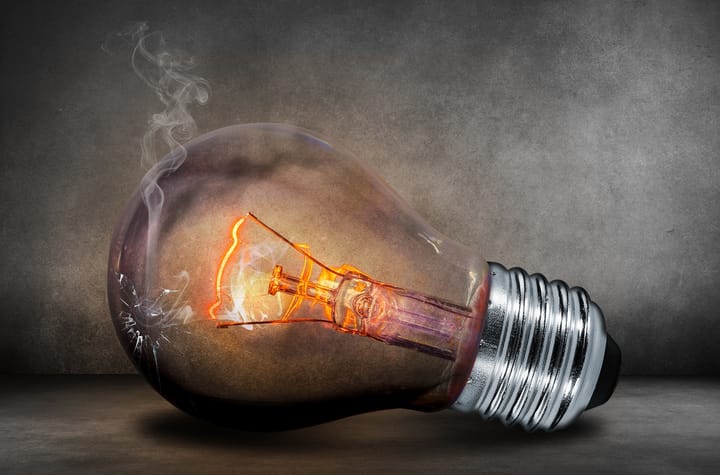Donald Trump is insane. Why isn't this a bigger issue?
A major U.S. Presidential nominee is obviously suffering from a severely incapacitating mental illness. Why aren't we talking about this?

I'm always a little uncomfortable writing current events posts as opposed to those strictly about history. But I have to ask – especially in light of my study of history – has anyone happened to notice that one of the major party nominees for U.S. President in this upcoming election is insane? And if you've happened to notice it, how come the legacy media generally has not? To anticipate the inevitable whataboutist retort to this suggestion, "What about Joe Biden?" – his mental capacity is definitely a legitimate issue, but even with that said, I don't think anyone can realistically claim that Biden suffers from a catastrophic and crippling mental illness. Trump, however, clearly does. That's obviously a much bigger problem than occasional age-related fogginess. I'd rather not have a President whose mental faculties are at all questionable, but given a choice between that and one who is an actual lunatic, you can see how these issues are not really comparable.
First and foremost: I have no training in psychology. I'm keenly aware that the word "insane" is not a recognized psychiatric term. It has a definition in law, which I have been trained in, but I'm not talking about that either. I'm talking about it in the way in which most of us commonly think of insanity, a condition in which a person is so deeply out of touch with reality that their ability to function as a rational human being is severely compromised. One does not have to be a clinical psychologist to recognize when a person is compromised in this way. If you were walking in front of me and suddenly screamed, clutched your chest, fell down and turned red, my reaction would not be to stand there and say, "Well, I'm not a cardiologist, so I'm not qualified to determine whether you're having a heart attack." I would call 9-1-1 and tell the person on the other end of the line that a person in front of me just had a heart attack and they should send an ambulance. Now imagine if this scenario played out, not on a random street somewhere, but in the Oval Office. Do you see what we're dealing with?
That former U.S. President Donald Trump is functionally insane, and has been for some time now, is plainly evident in his public behavior. In 2020, when he was defeated for re-election by Joe Biden, there was a lot of public discussion about whether Trump really believed, as he claimed, that the election had been stolen, or whether he was just saying that to rile up his supporters and fundraise off what has been called "the Big Lie." I think there's ample evidence that he really does believe that he won in 2020. For example, reporters Carol Leonnig and Philip Rucker interviewed Trump in Florida not long after he left office for their 2021 book I Alone Can Fix It: Donald Trump's Catastrophic Final Year. He didn't have to talk to them at all and the interview was not part of a fundraising or political ploy. Yet almost the first thing he said to them, and a theme that he kept harping on over and over again during their hours-long interview, was that he'd won the 2020 election and it was stolen from him. This belief seems to have hardened in the three years since. If there's any evidence that Trump really does internalize the fact that he lost in 2020, I have yet to see it.

Disbelief in the results of the 2020 election, at least for Trump, is not a political opinion – it is a delusion. Unfortunately millions of Americans share this false belief, but they are not functionally insane as a result of it because, for everyone except Donald Trump, the delusion is not at the animating core of their being. It is, however, for Trump. In this upcoming 2024 election, you can be sure that the one narrative Trump returns to on the campaign trail, the one reason he trumpets as to why he should be elected this year, is because he was wrongfully robbed of re-election in 2020. I wouldn't be surprised if Trump's last words before he dies are to assert that he won in 2020. There is simply no belief more fundamental to him, more entrenched, and more all-consuming than this. This qualifies him, I think, as insane. This is even aside from the very real possibility that Trump is also suffering from age-related dementia.
Furthermore, this is not just my uninformed layman's opinion. A qualified psychologist – who happens to be Donald Trump's niece – has rendered an opinion on her uncle's mental health, and it's her professional opinion that he's severely compromised by narcissism, delusions and personality disorders. When Dr. Mary Trump made this diagnosis a few years ago, most of the buzz in the press about it concerned the so-called "Goldwater rule," a red herring of an issue which I don't care about and won't get into here. But, as summarized by the very capable Dr. John "Doctor Zebra" Sotos, a physician and historian of Presidential medical history, the thrust of Mary Trump's analysis goes something like this:
Mr. Trump's psychiatric illness is best identified as "a mixed, severe personality disorder with sociopathic and borderline features." Specifically, it is a mixture of antisocial personality disorder and borderline personality disorder.
"Sociopathic" refers to a severe degree of antisocial personality disorder – a disease that psychiatrists formally diagnose in adults who have a "pervasive pattern of disregard for and violation of the rights of others," as described by the standard textbook of mental disorders, "The DSM-5."
"Borderline" does not refer to features that are on the verge of being abnormal. It refers instead to a defined list of clearly abnormal features that are not always present. It forms part of Trump's diagnosis because antisocial personality disorder does not alone account for all of the abnormal behaviors he displays.
Although it is tempting to apply narcissistic personality disorder to Mr. Trump, his illness, as Mary Trump observes, is larger than that. His antisocial features swallow (and exceed) his narcissism.
Specifically with regard to the "Big Lie" delusion, Dr. Sotos continues:
It is relevant to Mr. Trump's recent history, and typical of personality disorders, that a challenging environment will accentuate the disorder's symptoms, in particular, delusional thinking. Psychiatrists define a delusion as "a fixed idea at variance with reality, unamenable to change, with the exception of religion."
Mr. Trump's supremely challenging 2020 – impeachment, epidemic, economic collapse, riots, defeat in the election, defeats in the courts – likely hardened his self-interested deluded beliefs, so much so that he became mentally incapable of taking any action contravening them. This equates to a gross impairment of judgment, which was nowhere more apparent than in his videotaped message during the heinous riot at the Capitol on Jan. 6, 2021, in which he expressed sympathy and support for the rioters seeking to keep him in office.

This was written a couple of years ago, but if anything more recent events have shown how correct it is. Trump's functional insanity is evident on an almost daily basis. His speeches at campaign rallies are nonsensical rantings, often incoherent. Recently, for example, he praised fictional serial killer Hannibal Lecter, invented by writer Thomas Harris, as a great guy; it appears that Trump believes Lecter to be a real person. His other strange beliefs have long been documented, such as his apparent belief that his voice on the famous Access Hollywood tape was faked, or that beautiful women have to defecate only a few times in their lives. Taken in isolation these seem like oddities or quirks, usually equated with the clangers and verbal gaffes made by other politicians (including, frequently, Joe Biden). But when you know, as you do now, that they come from someone suffering from a fairly severe mental illness, they appear to be symptoms rather than quirks.
If Trump is insane, as he clearly is, why is this not a bigger issue? Why isn't the legacy media harping on it constantly, incessantly? What American in their right mind would support someone for President who suffers from persistent delusions? This person wants to be elected to an office where he can, on his own authority, order a nuclear strike. Suppose he's elected in 2024 and comes to believe that China was behind the "rigging" of the 2020 election, and he decides it's time to retaliate against them for that unforgivable sin? This isn't far-fetched. In the depths of his delusional illness, Trump may come to believe any sort of convoluted fantasy that makes no sense in the real world. To me this seems to be a danger far beyond the risk tolerance of any rational person.
The drafters of the 25th Amendment, passed and ratified in 1967, definitely had an insane President in mind as a possibility when working out a Constitutional procedure for removing a disabled chief executive. The 25th Amendment has never been invoked, and in fact failed miserably as a mechanism following the insurrection at the Capitol on January 6, 2021, which President Donald Trump fomented. Nancy Pelosi and other Congressional leaders pressured Vice-President Mike Pence to begin 25th Amendment removal proceedings against Trump immediately after the attempted coup, but he apparently refused, probably for political reasons. The 25th Amendment presumes that the officers who may sit in judgment of a President's sanity – chiefly the Vice-President and Cabinet officers – are looking at the situation rationally and objectively. But if those people happen to be political sycophants willing to deny their boss's mental incapacity for political reasons, the 25th Amendment is nothing but a scrap of paper, as it was in January 2021. We can't count on it as a backstop against an insane President.

Until recently I could never have believed that I would live in an America where a manifestly insane person could be a serious contender for the Presidency of the United States, and where millions of my fellow citizens are either ignorant of the candidate's insanity or willing to overlook it. Regardless of what side of the political spectrum you're on, what political objective is worth achieving at the cost of placing an obvious lunatic into the most powerful office in the world? How could this possibly benefit anyone on Earth, much less those who wish to vote for him? I simply don't understand why Trump's insanity is apparently a non-issue in 2024. If he is elected, I absolutely 100% guarantee that, in 2025, his insanity will become not only the biggest crisis in America, but possibly the most dire and dangerous issue in the world.
Donald Trump is insane. It's plainly evident. We need to talk about it. We need to do something about it. Otherwise, his illness could very well end us all. I'm not trying to be an alarmist. I'm looking at this thing as rationally as I can, and quite frankly, it scares the hell out of me. It should you, too.
The Value Proposition
Why should you be reading this blog, or receiving it as a newsletter? This is why.
☕ If you appreciate what I do, buy me a virtual coffee from time-to-time to support my work. I know it seems small, but it truly helps.
📖 You could also buy my newest book.
🎓 Like learning? Find out what courses I’m currently offering at my website.
📽 More the visual type? Here is my YouTube channel with tons of free history videos.



Comments ()